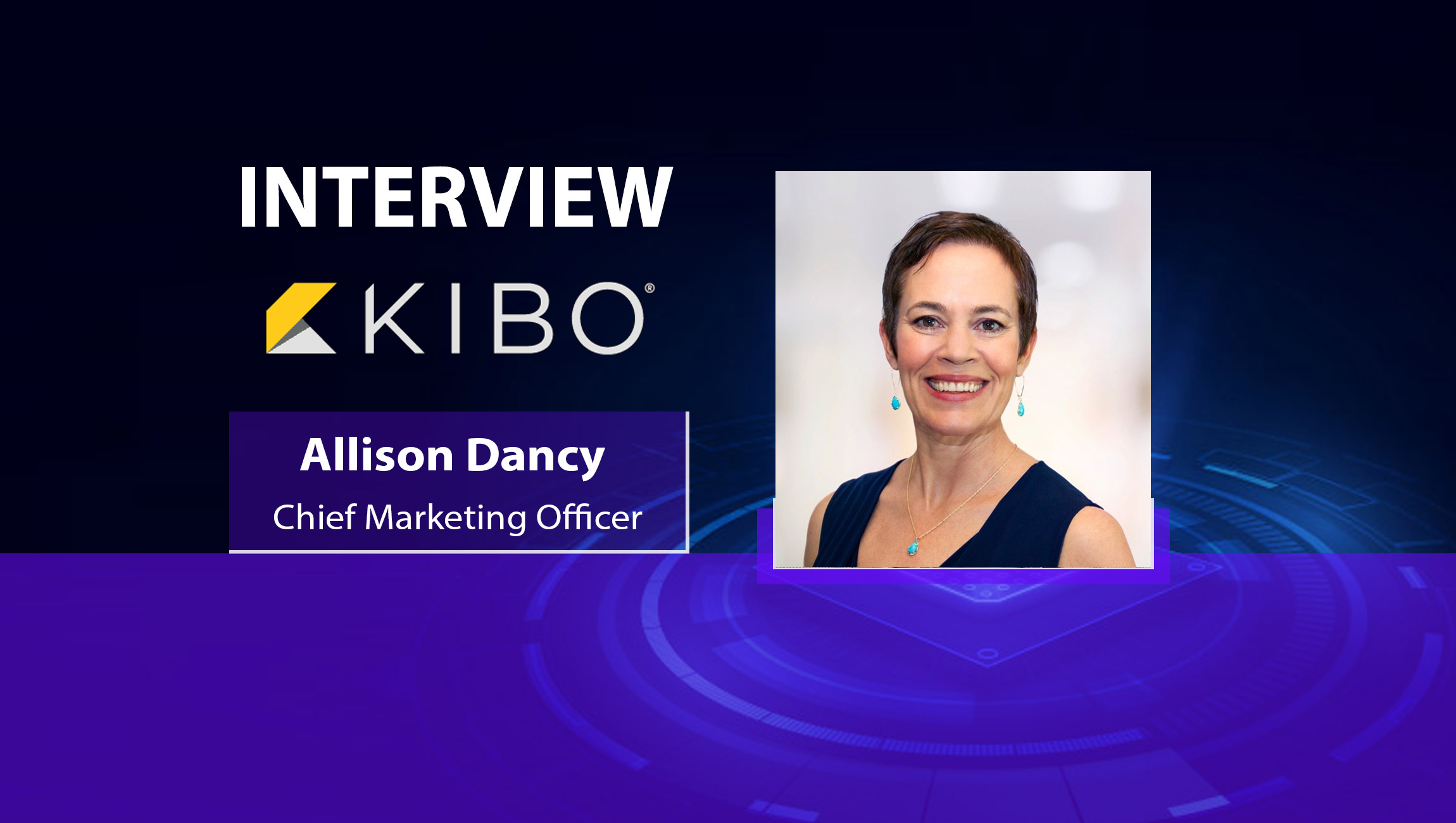AI-powered personalization systems can not only enhance the overall buying experience, it can also help brands gauge more about their actual buyer behaviors, Allison Dancy, Chief Marketing Officer at Kibo shares some thoughts:
________
Welcome to this MarTech Series chat Allison, we’d love to get to know you better! Tell us more about your role as CMO at Kibo and take us through some of your key B2B marketing moments from your journey so far?
What inspired you to enter the marketing arena and if you weren’t in marketing, what else would you have chosen to do?!
Thank you for having me! I’m thrilled to have joined the team at Kibo. Kibo provides industry recognized SaaS products that help B2C and B2B brands serve the most relevant, personalized online experiences to their consumers. We are the only vendor on the market today who combines a powerful eCommerce platform with enterprise-grade order management and AI-powered personalization to help brands capitalize on buying behavior and data trends and serve clients what they’re most likely to want and need, all while letting them search, buy, ship, pick up, and return merchandise in the manner that is most convenient for them. It’s modern commerce at its best. It’s a fun space to work in and the Kibo team is top-notch, from powerful products that fill a real need in the market, to an impressive roster of happy clients and an amazing group of talented co-workers.
My journey to this point started in sales where I learned what it takes to genuinely connect with buyers. I learned how to craft messaging based on product value and pain points and how to map the buyer’s journey and align it with the right outreach. My time in the field really informed me as a marketer. After selling, I moved into marketing and demand generation. From there I took on leading marketing teams which I’ve done for the last 10+ years.
I have always been fascinated by regional cultures, customer, languages, and food. I studied in the South of France during college and taught English in Japan for two years when I was just out of college. There was a trajectory of my life where I could have gone on to advanced studies and moved into cultural, linguistic, or food anthropology.
Marketing Technology News: MarTech Interview with Steve Earl, Vice President for Oracle CX
In your view, how is the face of B2B marketing evolving and what are some top trends you feel will dominate the market in 2022 and beyond?
B2B marketing is on the same journey as B2C marketing – one towards hyper-personalization. Buyers do more and more research online before ever talking with a brand. The best B2B marketers use all the tools at their disposal to track, analyze, and better understand each buyer-type to make sure they are speaking their language and helping guide them toward purchase by presenting a curated content journey or a curated product selection, in the case of B2C. Buyers expect you to understand who they are and what they need in advance.
People are tired of being tracked and blindly targeted. You need to make your outreach personal and relevant and speak to the pain points you solve for that buyer, not just to how great you think your brand is or your products are. And those interactions need to be human and non-robotic or salesy. Personalized outreach at scale is not easy, nor is aligning it across sales, marketing, and customer experience functions – thus the proliferation of software solutions that are trying to solve for this today.
Buying is a non-linear journey. There is never one touch that brings someone into a “funnel “and keeps them there. And there is never a simple answer around what will work. Marketing is making hypotheses, running plays, learning, iterating. It takes time to get it right.
Buyers with intent are all over you and your competitors sites researching at all hours of the day and night. The best B2B marketers are focused on engagement not just individual MQLs. This is easier said than done. Engagement is more difficult to tie directly to marketing spend because the MQL could ultimately come from any contact at the account (not the one officially in the campaign) or could come much later when there is a project defined, etc. It is harder to track and can be less valued by the organization. There is almost always pressure to drive immediate pipeline, but marketers have to try to balance this with working to build scalable, more “compoundable” marketing. Every piece of content and every web page visit should compound upon the next to educate and compel the next action. It isn’t easy to do.
What are some of the fundamental marketing processes that you feel new incoming CMOs need to focus on when taking over a new brand and marketing team?
Digital platforms need to be connected and talking to each other. The website is the alpha and omega of marketing. It tells the brand story. It is where the content you create lives and gets consumed by the prospects you are targeting. Ideally it mirrors the buyer’s journey and is where you send followers and respondents to your programs. It is what search engines are crawling to serve back results. It is how you track the efficacy of content, campaigns, programs, journey’s, etc. With increased privacy laws and less tolerance for unsolicited outreach, getting prospects to find and engage with your site is critical. Proper tracking, scoring, and conversion mechanisms on your website are so important.
Hierarchical messaging, ideal customer profiles, and personas all drive content mapping, which is critical. Content is the fuel that feeds your digital outreach and gives prospects something to binge on when they are ready to research you on their own.
Sales and marketing teams should have common goals and should align on targets, timing, messaging, key hand offs, rules of engagement in accounts, etc. Misalignment here are costly and frustrating. At best, teams waste time and dollars on the wrong leads or by overlapping efforts. At worse, the teams don’t want to engage with each other and feel like they are on opposing teams.
Marketing Technology News: MarTech Interview with Martin Wilson, Co-founder and Director at Bright
As someone who has spent a significant amount of time in marketing roles, we’d love to dive into a few top marketing technologies that have always helped achieve end goals?
Website technology. Marketing should own the site from information architecture, navigation, layout & design, content, and conversion metrics. It should ideally be built on a platform that the marketing team can manage without a lot of technical intervention. Waiting on internal IT teams or outsourced web developers can kill campaign cadence and delay pipeline creation.
Customer Relationship Management systems are used by both sales for tracking deals and deal progression, but also by marketing. Customer and prospect contact data is used for targeting campaigns and communications that are then tracked and scored and fed back into the system so SDRs and Sales know which contacts have engaged with which campaigns and content.
Marketing Automation platforms and the ability to automate long tail nurture and engagement tracks at scale help lower the cost to acquire customers and give you a way to build engagement over time. Scoring and weighting algorithms help align demographic information with buying signals and insights from digital behaviors.
Account based marketing platforms and intent data help marketers personalize outreach and landing pages, get a broad view into who is visiting your site, and gather information on prospects who are “in market” for your products. This has been a game-changer for marketing.
Can you talk about a few top challenges that you still see CMOs of today struggle with in the B2B market and what tips / best practices would you share here?
The CMO role is tough. The span of responsibility is so great and what we’re hired to do so broad, that it’s difficult to cover that much ground. We must be strategists, technologist, artists, executors, communicators, leaders, and politicians. We need to be great at hiring where we are less skilled, and we need to be masters at building and telling a narrative that is only partly about numbers and calculations. CMOs outpace IT teams in technology investments and are often the holders of more data than anyone in the organization. We need to have the skills to analyze and use mountains of data. Data scientists in marketing are the new becoming the new norm. B2B buyers also continue to demand more from the brands they buy from – before, during, and after the sales cycle. Navigating the expectations and demands of product, sales, customer service, c-suite, boards of directors, partners, business units, and customers is tricky. Marketing has a role to play up and down the organization. Being able to set strategy, get buy in, set expectations, deliver, and communicate complicated results quickly and effectively is hard.
Great marketing is dependent on tight alignment with product and sales. If that alignment is missing and hands offs aren’t happening – with product information, market fit, personas, differentiators, roadmap, account assignments, customer feedback, etc. it is very difficult for marketing to be successful.
Some last thoughts and marketing / martech takeaways and predictions for 2022 before we wrap up?
Intent data will continue to feed the way we go to market. To gain mindshare in our complex digital world, marketers need to strive to make more human, intimate connections by being hyper personalized and timely with their outreach. Privacy challenges will continue to grow, which makes brand building and amazing content more important. We’ll need to get prospects to engage with our brands directly. Education and thought leadership are critical. Continuing to find customers and partners to tell your story are also key.
Marketing Technology News:MarTech Interview with Rachel Meranus, CMO at Transfix
 Kibo is the only extensible, unified commerce platform that delivers personalized, omnichannel experiences. The platform combines AI-driven personalization from industry leaders Monetate and Certona, omnichannel commerce for B2C and B2B models, enterprise-grade order management, and customer data-enhanced point of sale. Global clients like Office Depot, Taco Bell, and Patagonia rely on Kibo’s API-first, microservices-based architecture to support a wide range of commerce strategies, including headless commerce, that meet high growth goals and deliver on customer expectations at a manageable cost of ownership.
Kibo is the only extensible, unified commerce platform that delivers personalized, omnichannel experiences. The platform combines AI-driven personalization from industry leaders Monetate and Certona, omnichannel commerce for B2C and B2B models, enterprise-grade order management, and customer data-enhanced point of sale. Global clients like Office Depot, Taco Bell, and Patagonia rely on Kibo’s API-first, microservices-based architecture to support a wide range of commerce strategies, including headless commerce, that meet high growth goals and deliver on customer expectations at a manageable cost of ownership.
Allison Dancy is the Chief Marketing Officer at Kibo. A data-driven marketing leader with more than 20 years of experience, Allison is a proven marketing executive with a long history of success in growing software companies through marketing innovation and execution. Allison brings deep expertise across all facets of marketing, including, but not limited to, demand generation, partner marketing, product positioning and field marketing. Prior to joining Kibo, Allison was the Chief Marketing Officer at OneTouchPoint, and before that, she was the marketing leader for Gotransverse, a leader in subscription and billing software. Allison began her career in marketing with IBM and Vignette before moving into marketing leadership roles with OpenText and CDS Global.
Missed The Latest Episode of The SalesStar Podcast? Have a quick listen here!
Episode 105: Biggest Sales Enablement Trends and Challenges with Mert Yentur, CEO and Founder at Pitcher AG
Episode 104: CMO Best Practices with Kevin Tate, Chief Marketing Officer at Clearbit
Episode 103: B2B Optimization And Engagement Strategies With Chris Tranquill, Chief Of Strategy At Khoros



